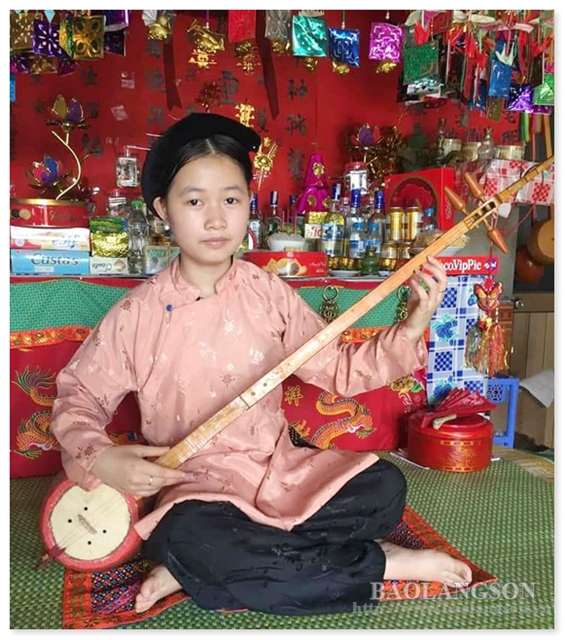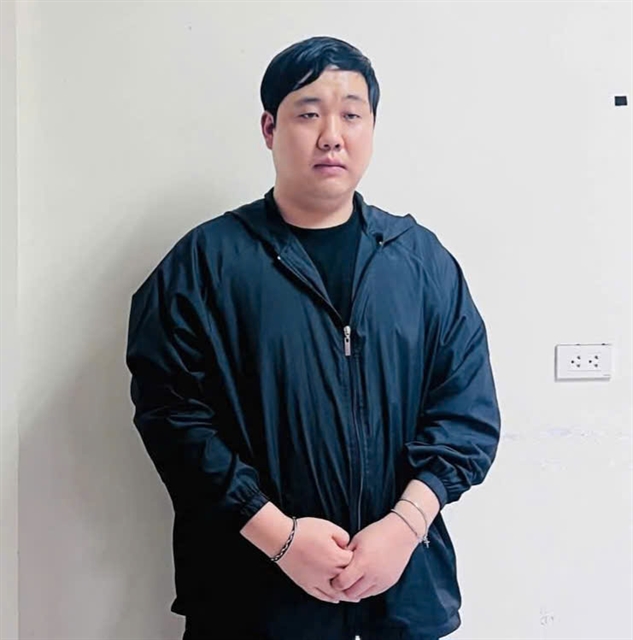

Liễu Thị Minh Thơ is an unusual shaman. She is only seventeen years old. Her work as a shaman involves singing, playing and dancing. She usually performs in the homes of people she helps.

|
| Liễu Thị Minh Thơ learned the then rituals at the age of 13. Photo baolangson.vn |
by Nguyễn Thúy Bình
When most people hear the word shaman, they imagine a wizened old man with a long white beard. At just 17 years old, Liễu Thị Minh Thơ defies all expectations, surprising everyone with her deep knowledge of rituals.
Born in 2002 in Phú Xá Village, Cao Lộc District in the northern province of Lạng Sơn, Thơ has been working to preserve and promote then rituals through her passion, talent and hard work.
At the age of 17, Liễu Thị Minh Thơ is the youngest then shaman in the northern province of Lạng Sơn. Photo dantocmiennui.vn
Then is a popular set of religious beliefs among the Tày and Nùng ethnic people in the northeastern mountainous area of Việt Nam.
There are various legends on the origin of then according to which the tradition could have endured through thousands of years and still exists in the lives of these ethnic groups. Then shaman can be men or women.
Then rituals are present at important events such as a child's full-month ceremony, long-life celebrations, house building, marriages and deaths. Then shamans carry a special role in the community and are highly respected.
“Then is a form of performing rituals with lyrics, music and costumes,” Thơ said. “It is central to the culture of the Tày and Nùng ethnic groups and is passed down from generation to generation.”
Watching Thơ performing a ritual, it is impossible not to appreciate her talent. Her singing, dancing and instrument playing all work together in harmony.
Thơ has been busily preparing a then ritual to perform for a customer on July 6 (the fourth day of the sixth lunar month) to pray for a good education.
Typically she performs the ritual at the customer's house, but on this occasion the customer requested it take place at Thơ's home.
Her customer is Tô Thị Nga, a 34-year-old in Lạng Sơn. Nga has paid Thơ to perform the ritual.
The offerings include a pig's head, chicken, fish, confectionery, drinks and paper votive offerings such as a house, clothes, utensils and furniture.
The ceremony is expected to start at 8am and finish by 3pm. During that time, Thơ will play her tính instrument and sing then songs. She will perform nonstop without a break from the morning to the afternoon.
There are different then rituals for all different types of occasions, so she has to learn many different songs by heart.
Lẩu then is the most important set of rituals for a shaman. It takes three years of study to become a shaman. After completing all five lẩu then, the shaman is finally considered a master.
It is said that after each lẩu then, the shaman will be more prestigious and able to help more people.
Thơ became a shaman in March last year and is the youngest shaman in Lạng Sơn.
She has liked then since a young age but never considered becoming a shaman even though one of her ancestors was also a shaman.
She was frequently sick as a child and her family invited shaman Vi Thúy Nhung to pray for her. She credits those prayers for her survival.
From a young age she fell in love with the emotional melodies of then songs and the sound of the tính instrument. She also loved the stories passed down by old women about the culture of the Tày.
She began studying to become a shaman when she was 13 years old under the tutelage of shaman Nhung.
She quickly proved herself as a gifted and dedicated student, learning many folk songs by heart. Now she can confidently play and sing hundreds of songs for different rituals.
After one year, Nhung performed the lẩu then ritual to recognise her student as a shaman.
Since then, words of Thơ's skill as shaman has spread even though she was only 15 years old. She is often invited to perform rituals for people in provinces far from home.
"I have devoted a lot of time and energy to become a shaman," Thơ said. "A shaman requires hard work and a good memory. To practise rituals professionally it is important to learn the songs by heart according to the oral traditions, to be skilful and be in good health."
In her three years as a shaman, Thơ has performed an average of 60 to 100 rituals per year. They have become community events and a chance for cultural exchange, often drawing big crowds.
In addition to practising at home, Thơ performs at festivals held by the Lạng Sơn Cultural and Art Centre to win prizes.
Master singer Triệu Thị Thủy Tiên, deputy chairwoman of the Lạng Sơn Folk Song Association, praised Thơ's performance at the National Then Singing Festival in Hà Giang last year.
"She is representing a young generation and keeping the treasures of Tày folklore alive," Tiên said. "Her practice and performances have contributed to preserving and promoting then songs in the province."
Thơ won gold at the festival for performing an excerpt from the lẩu then ritual.
Lạng Sơn is home to about 65 clubs that gather folk singers and musicians working to preserve then singing and rituals. Then rituals were submitted to UNESCO for recognition as a cultural heritage in 2017. VNS
When most people hear the word shaman, they imagine a wizened old man with a long white beard. At just 17 years old, Liễu Thị Minh Thơ defies all expectations, surprising everyone with her deep knowledge of rituals.
Wizened means wrinkled. This usually happens to someone when they become old.
Defies means “goes against”.
Expectations are what people expect of you.
Rituals are ceremonies that follow a schedule.
Born in 2002 in Phú Xá Village, Cao Lộc District in the northern province of Lạng Sơn, Thơ has been working to preserve and promote then rituals through her passion, talent and hard work.
Preserve means to keep in a good condition.
To promote something means to say good things about it so that people think highly of it.
If you have a passion for something, you love it so much that you do not worry about how much time or money you spend on it.
Then is a popular set of religious beliefs among the Tày and Nùng ethnic people in the northeastern mountainous area of Việt Nam.
People of an ethnic group are of the same race, follow the same culture, religion and speak the same language, which may be different to most people around them.
There are various legends on the origin of then according to which the tradition could have endured through thousands of years and still exists in the lives of these ethnic groups.
Legends are traditional stories.
Endured means survived.
Then shamans carry a special role in the community and are highly respected.
If something, or somebody, is respected, people look up to them.
“Then is a form of performing rituals with lyrics, music and costumes,” Thơ said.
Lyrics are the words of a song.
“It is central to the culture of the Tày and Nùng ethnic groups and is passed down from generation to generation.”
You and your brothers and sisters are one generation; your parents and their brothers and sisters (your aunts and uncles) are another and your grandparents and their brothers and sisters (your great aunts and great uncles) are yet another generation, and so on.
Watching Thơ performing a ritual, it is impossible not to appreciate her talent.
To appreciate something means to believe that it has value.
Talent is natural skill.
Her singing, dancing and instrument playing all work together in harmony.
A harmony is a combination of musical sounds and actions that give pleasure to people who watch and listen to them.
Thơ has been busily preparing a then ritual to perform for a customer on July 6 (the fourth day of the sixth lunar month) to pray for a good education.
A customer is someone who pays money to buy something.
The offerings include a pig's head, chicken, fish, confectionery, drinks and paper votive offerings such as a house, clothes, utensils and furniture.
Confectionery means cakes.
Votive means offered along with a wish.
She has liked then since a young age but never considered becoming a shaman even though one of her ancestors was also a shaman.
Your ancestors are your parents, their parents (your grandparents), their parents (your great grand parents) and so on.
She was frequently sick as a child and her family invited shaman Vi Thúy Nhung to pray for her. She credits those prayers for her survival.
Frequently means often.
From a young age she fell in love with the emotional melodies of then songs and the sound of the tính instrument.
Something that is emotional brings about a feeling from the heart. Melodies are tunes.
She began studying to become a shaman when she was 13 years old under the tutelage of shaman Nhung.
Tutelage means instruction.
Now she can confidently play and sing hundreds of songs for different rituals.
If you do something confidently, you do it believing in yourself.
"I have devoted a lot of time and energy to become a shaman," Thơ said.
Devoted means “given”.
To practise rituals professionally it is important to learn the songs by heart according to the oral traditions, to be skilful and be in good health.
Oral means by word of mouth. In other words traditions that people are told about rather than they read about.
Lạng Sơn is home to about 65 clubs that gather folk singers and musicians working to preserve then singing and rituals. Then rituals were submitted to UNESCO for recognition as a cultural heritage in 2017.
Submitted means “handed in”.
WORKSHEET
State whether the following sentences are true, or false:
ANSWERS: 1. False; 2. False; 3. True; 4. True; 5. True.









